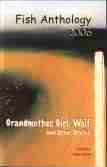What IS going on? I'm suddenly getting a lot of hits going directly to a story posted in November here...linked to an image of a willow tree. Is there a willow fetish sweeping the world?
To make life easier, here's the story again: complete with grammatical errors, and other glitches. This was written in about fifteen mins and is not exactly a masterpiece... it was only posted as I'd been blocked for a while and was glad to be writing.
All explanations about the flurry of interest would be received with gratitude.
There was once a husband and wife who lived on a poor farm, where the soil was thin, and where there were no hills round about to protect it from the winds that blew from the north. The farmer had over the years cut down all the trees on his land for fuel, leaving the fields bare, so that when that wind did blow from the north, it met no obstacles at all, and cut across the grass like it had knives in its teeth.
I say the farmer had cut down all the trees… but that is not quite right. He had a river running along the boundary of his farm, and on the bank this side, he had left some willow trees, believing the wood to be damp and bad for burning, and the branches too spindly to be used for anything much. Besides, the bank was treacherous. And the farmer never wanted to risk his life in the fast flowing waters of the river. So on this side, the willows stood tall. For in those days, the willow had not learned what it was to weep.
On the other side of the river, on the other bank, the trees were poplars. Standing tall and straight, their leaves shimmering in the evening light.
The farmer and his wife had many children. One after another, they had babies, because they would need help on the farm as they grew older. Of course, in those days, and in that country, the babies were taken to be baptised, taken to the river with the village priest in attendance, while they were dipped quickly in the water.
The farmer and his wife had a special net made for this purpose. They would stand with the priest on the solid ground close to the trees, and would put their latest baby in the net. Then they would wait until the priest was intoning the correct prayers, and they would stretch the net out over the field, the bank, right to the river, and they would gently lower their latest child into the flow, and name him.
But for each ceremony, the village priest required payment. He would ask for not only coins, but cloth. Not only cloth but meat. Not only meat but the finest wines that grew on the north facing slopes of the valley.
And so gradually, the farmer and his wife grew poorer and poorer. Not only did they have to pay the priest, but the farm did not repay their hard work. And one by one, not long after their baptism ceremonies – indeed, some versions of this story say because of the baptism ceremonies – the farmer’s babies died and were taken to the village church in small coffins, to be laid in the ground.
It was not long before the farmer and his wife were again expecting another baby.. And not long before they realised, after counting their money on the kitchen table one evening, that they had not enough money left to pay the priest to baptise this child when it came.
The baby was born, and it lived three days, before it too, was taken along the village street to the church to join its brothers and sisters in the earth. But the priest stood at the gate of the cemetery, and barred the way.
“Only those whose souls have names are welcome here,” he said, and he turned the couple away. And they walked home carrying their child in his wooden box. That night, they went in the darkness down to the river carrying their child and the baptism net they had used for all their other babies. And when they were watched by nothing but stars, they took the child from his box, placed him in the net, stretched out the net on its long handle through the willow branches, and down to the water.
They moved the net gently this way and that in the current, feeling the water playing with the burden. They felt the burden shifting, heavy, not heavy, until suddenly, there was no weight at all…. And the two of them turned their backs on the river, and returned home.
The wind blew from the north that night, unhindered. It blew the grass across the fields, leaving bare patches where it tore the grass up by the roots. And when it reached the river, the wind blew the trees until they were almost bent in two.
But the trees would not break. It has been the purpose of trees to guard the souls of the dead since as long as anyone can remember – and for them to break would be to relinquish their reason for being. In the very beginning, each tree was given a different soul to guard. Dark upright fir trees guarded the souls of soldiers fallen in battle. Great oak trees guarded musicians. The aspen guarded the souls of poets. And so on, until poplar trees were chosen to guard the souls of babies who lived less than a week.
The souls of the farmer’s babies played at night high among the leaves of the poplar trees by the river. They looked down at the farmer and his wife and sang, making the same sound as the wind. And when the soul of their little brother appeared on the sand by the river, they reached down their arms to lift him into their tree. But the poplar was only allowed to guard the souls of named babies, and the babies’ arms were not long enough nor were they strong enough to take their unnamed brother into the tree.
Back then the willow had not been told which souls to guard. All souls seemed to have been taken. And back then, the willow tree stood tall and erect, just like the poplar trees.
The soul of the unnamed boy stood on the sand at the foot of the willow tree, and tried to catch its branches as they swayed in the wind. He looked up into the poplar, and saw his brothers looking down at him, the space between too great. Perhaps if he could grasp a branch, he might climb up to join them? But the branches of the willow tree were too high, too erect. They thrashed in the wind out of his reach.
For months, the soul of the unnamed child stayed at the foot of the willow. And each time the north wind blew, he tried to jump and catch a branch, to climb up to join his named brothers. And for months, the heart of the willow tree filled with tears for the child.
Slowly, the warmth of those tears softened the wooden heart of the willow tree, and each time the wind blew, the branches softened, and bent, until they almost reached the ground. The soul of the unnamed child caught hold of the branches, and played … swinging higher and higher as the wind blew. He called out to his named brothers to come down! Come down! Come and play and swing!
But the named brothers high in the poplar tree could not come down. Their place was at the very top of the poplar, close to the clouds.
Soon, the branches of the willow tree were so soft, that they bent right into the river as it flowed at its foot. And the next time the soul of the unnamed child played, it swung its branches out over the river, and dipped the child into the water, then sprang back, lifting him into the air and back onto the sand of the bank.
And as it did so, the willow tree gave the soul a name.
Afterwards, and until this day, the willow tree’s branches have swept the surfaces of rivers. And they guard the souls of unnamed babies who die before they have been on the earth for a week.
And on the opposite river bank, as is often found, there may be poplar trees. And when the wind blows from the north, if you stand close by and listen, you will hear singing.
It is the souls of the named and the unnamed calling across the water to each other, asking each other to come and play.
But they do not know which names to call. For the poplar tree and its souls cannot understand the language of the willow. And the willow cannot understand the language of the poplar.
But it is only the willow whose heart has melted enough to weep for the lack.
Monday, 2 March 2009
Subscribe to:
Post Comments (Atom)




.JPG)























1 comment:
I suspect it has something to do with the Celtic/Pagan/Wiccan month of Willow, which covers part of March and April. People looking up their rites and info. Especially since your piece uses the keyword 'priestess', too. See the following cached link: http://74.125.95.132/search?q=cache:FxLJgAKI2ZsJ:cerridwen999.multiply.com/journal/item/252+willow+march&cd=7&hl=en&ct=clnk&gl=us
Okay, so I admit I have a little bit of a willow fetish, myself:) It's a favorite tree, and pussywillows a favorite "flower".
Post a Comment